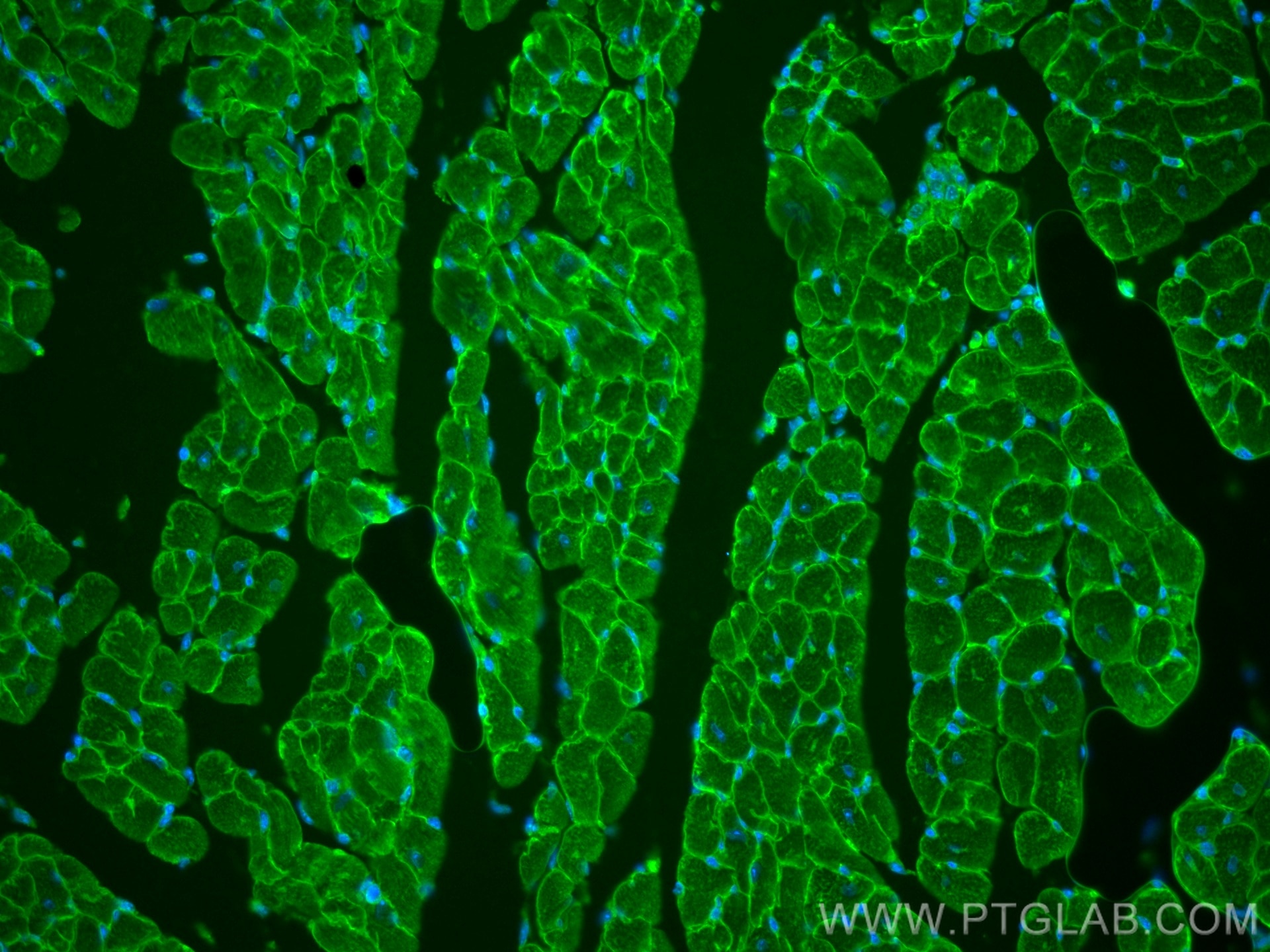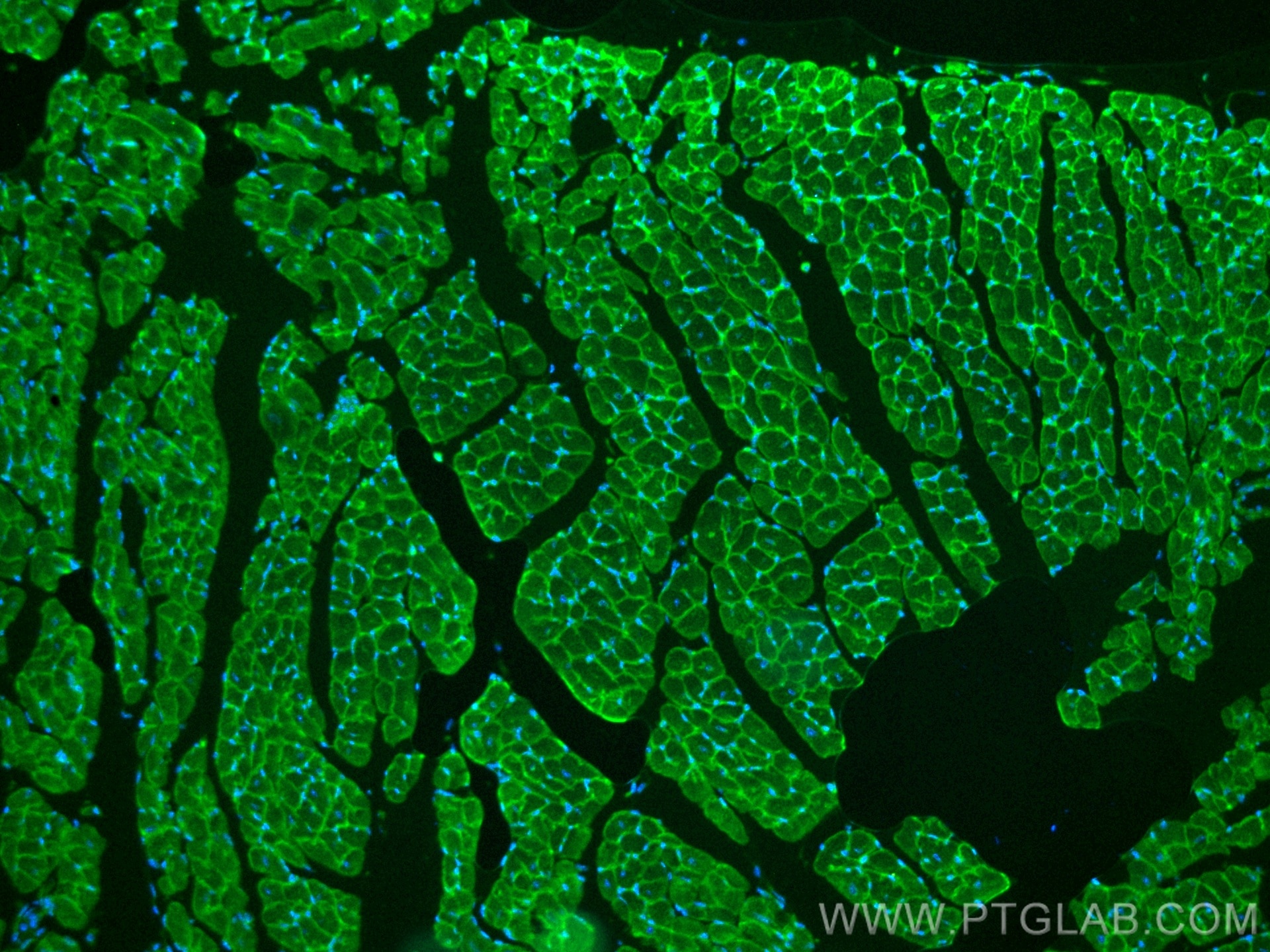Validation Data Gallery
Tested Applications
| Positive IF-P detected in | mouse heart tissue |
Recommended dilution
| Application | Dilution |
|---|---|
| Immunofluorescence (IF)-P | IF-P : 1:50-1:500 |
| It is recommended that this reagent should be titrated in each testing system to obtain optimal results. | |
| Sample-dependent, Check data in validation data gallery. | |
Product Information
CL488-66735 targets Dystroglycan in IF-P applications and shows reactivity with Human, Mouse, Rat, Pig samples.
| Tested Reactivity | Human, Mouse, Rat, Pig |
| Host / Isotype | Mouse / IgG1 |
| Class | Monoclonal |
| Type | Antibody |
| Immunogen | Dystroglycan fusion protein Ag27222 相同性解析による交差性が予測される生物種 |
| Full Name | dystroglycan 1 (dystrophin-associated glycoprotein 1) |
| Calculated molecular weight | 97 kDa |
| Observed molecular weight | 43 kDa, 30 kDa |
| GenBank accession number | BC012740 |
| Gene Symbol | Dystroglycan |
| Gene ID (NCBI) | 1605 |
| RRID | AB_2934490 |
| Conjugate | CoraLite® Plus 488 Fluorescent Dye |
| Excitation/Emission maxima wavelengths | 493 nm / 522 nm |
| Form | Liquid |
| Purification Method | Protein G purification |
| UNIPROT ID | Q14118 |
| Storage Buffer | PBS with 50% glycerol, 0.05% Proclin300, 0.5% BSA , pH 7.3 |
| Storage Conditions | Store at -20°C. Avoid exposure to light. Stable for one year after shipment. Aliquoting is unnecessary for -20oC storage. |
Background Information
Dystroglycan, also known as DAG1 or DG, was originally isolated from skeletal muscle as an integral membrane component of the dystrophin-glycoprotein complex (DGC). In addition to skeletal muscle, dystroglycan is strongly expressed in heart and smooth muscle, as well as many non-muscle tissues including brain and peripheral nerve (PMID: 12556455). The dystroglycan is involved in a number of processes including laminin and basement membrane assembly, sarcolemmal stability, cell survival, peripheral nerve myelination, nodal structure, cell migration, and epithelial polarization. Dystroglycan consists of two subunits (alpha and beta), which are translated from a single mRNA as a propeptide that is proteolytically cleaved into two noncovalently associated proteins (PMID: 16410545). Alpha-dystroglycan is a 156-kDa extracellular peripheral glycoprotein, while beta-dystroglycan is a 43-kDa transmembrane protein (PMID: 9858474). The 43-kDa beta-dystroglycan can be cleaved into a ~30-kDa form (PMID: 14678802; 18458097; 17255331).
Protocols
| Product Specific Protocols | |
|---|---|
| IF protocol for CL Plus 488 Dystroglycan antibody CL488-66735 | Download protocol |
| FC protocol for CL Plus 488 Dystroglycan antibody CL488-66735 | Download protocol |
| Standard Protocols | |
|---|---|
| Click here to view our Standard Protocols |

